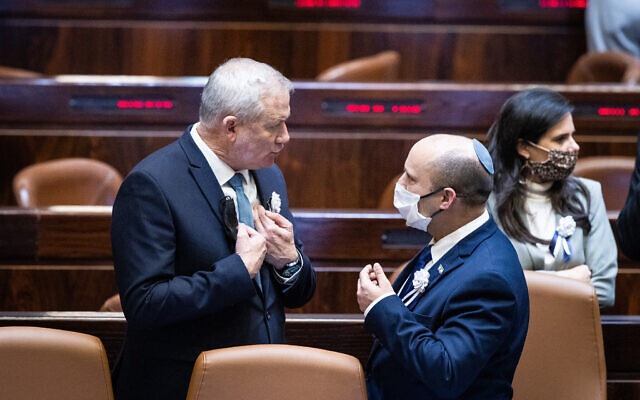
After Israel’s aggressive actions at the al-Aqsa Mosque compound in Jerusalem, during Ramadan, storming the Holy site and attacking its worshippers, it seemed as if Jordan was growing further away from Israel politically. However, this now seems to have been completely reversed with the transition of power to Israel’s new Prime Minister Naftali Bennet.
On May 10, constant attacks on Palestinian worshippers at the al-Aqsa mosque compound had culminated in what would become known as the 11-day war between Palestinians and the Israeli government. During this time, the Hashemite King of Jordan, King Abdullah II, seemed to have permitted protesters from Jordan to easily approach the border with Israel and permitted an unusual amount of condemnation within the Kingdom of Israel’s actions.
Jordan, as of its 1994 peace treaty with Israel, is recognised as the safe keeper of the al-Aqsa Mosque compound in Jerusalem and manages security inside of the site. Despite this, however, Israel has continued to violate the spirit of the agreement with Jordan by running unjustified and violent incursions into the site. As a result of the Israeli attacks, which in total injured over 1000 people, during Ramadan this year, Jordan seemed to have been coming to loggerheads with the Israelis.
Yet now, the reactionary regime of Jordan seems to have completely forgiven Israel’s actions and demonstrates its lack of care for the continued attacks at the site, as well as Israel’s ethnic cleansing policies inside of East Jerusalem.
Following a secret meeting in Amman, between Israeli PM Naftali Bennet and King Abdullah II, the two regimes had finalized a deal for 50 Million cubic meters of water to be sold to Jordan. This water sale is a problematic one, not only due to the timing of the deal just months after the previous tensions, but also due to the fact that the water is often stolen from underneath the West Bank.
On July 10, Jordan’s King reportedly called Israel’s newly instated President, Isaac Herzog, informing him that he has been “satisfied” with the efforts of the new Israeli government to mend ties with the Hashemite Kingdom.
Another interesting aspect to the newly restored relationship – as shown to the public – between Jordan and Israel, is that Jordan has negotiated a deal with Israel to allow 700 million USD in imports to the West Bank from Jordan, up from 160 million USD last year. This perhaps indicates that the Israeli government is using Jordan as means of helping to keep the Palestinian Authority (PA) in power. By making the economic situation better and allowing for West Bank business to flourish, there is less chance that the recent protests from Palestinians in the West Bank, aimed at forcing the PA out of power, will continue.
The close relationship between the Hashemite Kingdom and the PA has been shown throughout the years, with the Palestinian Authority security forces receiving most of their training from Jordan.
A potential reason behind Jordan’s shift back into a more friendly relationship with Israel, is – aside from business dealings – the departure of former Israeli Prime Minister Benjamin Netanyahu. Netanyahu, during the Trump era, was accused of having collaborated with the Kingdom of Saudi Arabia in a plot to depose King Abdullah II and/or to destabilize the Kingdom with the idea in mind of replacing the King with his half brother Prince Hamzah. Earlier this year we saw drama ensue with what Jordan said was an attempt to destabilize the country, which resulted in the likes of Prince Hamzah being placed under an unofficial house arrest. Bassem Awadallah, former Jordanian Royal Court Chief and later adviser to Saudi Crown Prince Mohammed Bin Salman, along with Sharif Hassan bin Zeid, were recently found guilty of sedition in relation to this incident.
It is well understood that Trump’s ‘Deal of the Century’ model to solve the Israeli-Palestine question, was secretly seeking to place the control of the al-Aqsa compound under Saudi supervision, allegedly in return for the KSA’s normalisation with Israel. For the Hashemite ruler of Jordan, Abdullah feels as if custodianship over the region’s Holy Sites is a birth right. The reason for this is due to his family bloodline leading back to the Prophet Mohammed. When Britain defeated the Ottomans beside the Arab armies, the UK had promised an Arab State to the likes of Sharif Hussein and Prince Faisal, yet due to an insurgency by the Ibn Saud family, Britain quickly reneged on its promises. So the family which was once in line to rule over all 3 of Islam’s holiest sites, suddenly had the lot taken from them.
With Netanyahu’s fall from power, whether temporary or permanent, it has again proven that the commitment of the Jordanian regime is to itself and its purpose has nothing to do with defending Human Rights or even the al-Aqsa Compound. The Jordanian regime has consistently been a steady military base from the US and NATO forces, working as one of the West’s closest and most stable Middle Eastern allies. Although the relationship had been derailed during the Trump years, it seems that under the US Biden administration there has been a shift towards the traditional US policy of supporting Jordan’s stability. This seems to be the priority of Jordan now, to gain back its position as a top ally of the United States and to ensure the success of the Hashemite regime above and beyond all. If anything, Jordan, like the Palestinian Authority, is demonstrating its uselessness to the people of the region and its status as a poodle of the West and Israel.
 RSS Feed
RSS Feed















 July 16th, 2021
July 16th, 2021  Awake Goy
Awake Goy  Posted in
Posted in  Tags:
Tags: 













